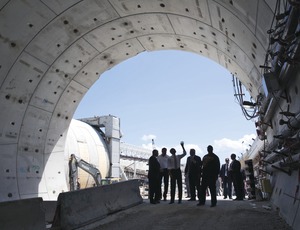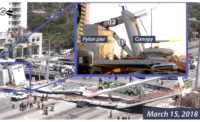
President Obama paid a March 29 visit to PortMiami—the site of a $1-billion tunnel project financed partly by private funding—and promoted ways of increasing both public and private funding for infrastructure.
"There are few more important things that we can do to create jobs right now and strengthen our economy over the long haul than rebuilding the infrastructure that powers our businesses and our economy—our roads, our bridges, our schools and our ports just like this one," the president said.
With the Panama Canal expansion targeted for completion by 2015, many U.S. ports are expanding to handle the larger ships that will use the canal and looking for help from the federal government. Last July, Obama signed an executive order expediting federal permitting for projects at the ports of Charleston, S.C.; Jacksonville, Fla.; Miami; New York City and New Jersey; and Savannah, Ga.
That directive carries no funding, however. Florida Gov. Rick Scott (R) noted as much when he chided Obama for the federal government's inability to fund its part of a $180-million project to deepen PortMiami's channel to 50 ft from 42 ft. The Army Corps of Engineers' Jacksonville District expects to award a dredging contract in May.
More help could be coming. The Senate Environment and Public Works Committee unanimously approved on March 20 a new water-resources bill, one provision of which is of particular interest to ports: It would require Harbor Maintenance Trust Fund annual spending on dredging work to equal the fees that flow into the fund. In recent years, spending has fallen far short of the fund's income. If enacted, the provision would spark increased spending on dredging.
In Miami, Obama did not mention the Senate bill or Scott's criticism about dredging funding. Instead, the president focused on infrastructure proposals, many of which he outlined in his State of the Union speech or earlier.
He emphasized ideas to encourage private spending on such projects and called for an infrastructure bank, new "America Fast Forward" bonds and an expanded TIFIA transportation loan program.
In addition, Obama is seeking changes in tax-exempt private-activity bonds, including eliminating the volume cap on such bonds used for water infrastructure and boosting the limit for bonds that finance highways or freight-transfer facilities. Obama also wants to exempt foreign investors, such as pension funds, from being taxed on gains they reap from investments in U.S. infrastructure.
Drawing more private infrastructure dollars "is something that we have consistently supported," says Sean O'Neill, Associated General Contractors of America congressional relations director for infrastructure advancement. "The more money that's in the construction marketplace, the better off that we are as an industry."
Congress has not adopted some of Obama's ideas, such as the infrastructure bank. But other elements, such as removing the water-infrastructure bond cap, have had substantial support on Capitol Hill.












Post a comment to this article
Report Abusive Comment